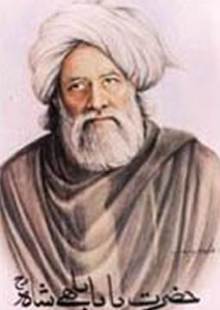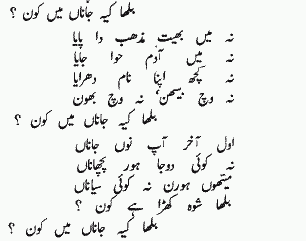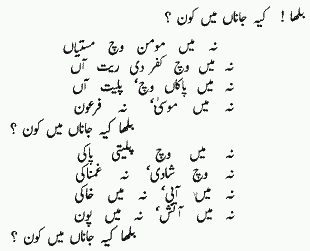Adil Najam
 A whole new generation has rediscovered Bulleh Shah. That is good.
A whole new generation has rediscovered Bulleh Shah. That is good.
Much of the credit for this rediscovery goes to the ‘sufi rock’ band Junoon and, more recently to the New Delhi singer Rabbi Shergill, and most importantly to the magnetic simplicity of ‘Bulla, ki jaanan mein koun.’ (I guess, Abida Parveen did for our generation what these guys are doing in interpreting Bulleh Shah for a new generation).
I must confess that I am a traditionalist and prefer more classical renditions of this timeless piece. My own sense, much like Deevan’s (of the blog ‘Rambling On’), is that Rabbi Shergill does a far superior job than Ali Azmat did. At least for me, Rabbi seems to ‘gets it’ more than Junoon did. But, in honesty, I am grateful to both; I also think that both should be grateful to Bulleh Shah.
So, why not judge for yourself. Here is the rendition by Rabbi Shergill. If you are new to Bulleh Shah, listen to it a couple of times before giving up on it. You can view it here by clicking on the play (arrow) button on the image below, or go to video.google.
For those who may want it, here is a version of the original and a translation by Kartar Singh Duggal:


I know not who I am
I am neither a believer going to the mosque
Nor given to non-believing ways
Neither clean, nor unclean
Neither Moses not Pharoah
I know not who I am
I am neither among sinners nor among saints
Neither happy, nor unhappy
I belong neither to water not to earth
I am neither fire, not air
I know not who I am
Neither do I know the secret of religion
Nor am I born of Adam and Eve
I have given myself no name
I belong neither to those who squat and pray
Nor to those who have gone astray
I know not who I am
I was in the beginning, I’d be there in the end
I know not any one other than the One
Who could be wiser than Bulleh Shah
Whose Master is ever there to tend?
I know not who I am.
‘Ki jaanan mein koun’ is the best known and most elegant of Bulleh Shah’s work and is itself an adaptation/translation from the works of earlier Persian philosophers. I wish that more people and singers will start looking at the rest of Bulleh Shah’s repertoire. Some have. For example, Shoaib Mansoor has already done a wonderful rendition of ‘Teray ishq nachaya kar thai-ya thai-ya’ as part of the Supreme Ishq series. And Noori has a song that seems inspired by ‘Kuttey tain-to uttay’.
If others also paid Bulleh Shah more attention, they might find that in terms of his themes Bulleh Shah may be the most contemporary poet in South Asia today. Try looking at ‘Bass kar ji’ (Enough is enough) or ‘Moun aayee baat na rehndi hai’ (I must utter what comes to my lips) and you will find them resonating with your most contemporary political and social preoccupations.
Followup post on Bulleh, Jugni, Shergill & Junoon, here.



















































TRUTH
at their core the sufi poets of before were like the punk rock of today.
THEY WERE NOT SUFI’S,,,,,,,they were MAJZOOBS !
there is a lot of difference between a sufi, a qalandar , a majzoob,a dervish, a wali, a qutb , an Imam etc
Unless one has some good knowledge about all of them it is wrong to say that they were like PUNKS or maybe hippies !
The sufis were not rebellious,,,,,they only taught the truth and, in a way, you may call bitter truth they preached as mutinous against the contemporary hypocritical society. This however doesn’t lower the rank and dignity of the sufis as such.They were and they will continue to remain above ordinary men.
I am sure that if Bulleh Shah was alive today he would be a punk rocker! In his own time the religious establishment that now reveres his ’sufiana kalam’ shunned him and he was not part of the establishment
i am dumb founded at the height of imagination of this ‘liberal” person ! Thanks goodness he didn’t say the Sufi would striptease at the hoo-ha of bhangra and disco !
The Sufi is a sufi because he is not a part of his establishment,,,,,he’s a leader not a follower ! If some one doesn’t interest a person he’s not necessarily a person to be looked down upon or made target of ridicule ! The one who ventures to do that is NOT one of his own establishment; he’s out of time and tune !
I dont care what the music says I dont care what the poetry says but the moment I listened to this song tears bursted out and every phrase of the poetry made me cry and cry every time i listen to it i cry i find myself in despair i feel myself standing alone …aimless…painless but crushed with painful darts…trust me read the lyrics and the moment you get a hook of them you are deep down in its spell…everytime i listen to this song i feel as if i am an unfaithful perv but the very next moment it makes me proud that i am on the right side …twists my mind my feelings everything …May GOD know if i am faithful or not???? share and email your comments on my email sufian_35677@hotmail.com love and cry
I do agree that at their core the sufi poets of before were like the punk rock of today. They were certainly the LIBERAL voice of their time. At the core their message is a message of rebellion. It is interesting to see people trying to co-opt their message which was always anti-establishment. The reason this poetry is timeless is that it appeals to all generations in its rebellion against the establishment, espesially the religious establishment.